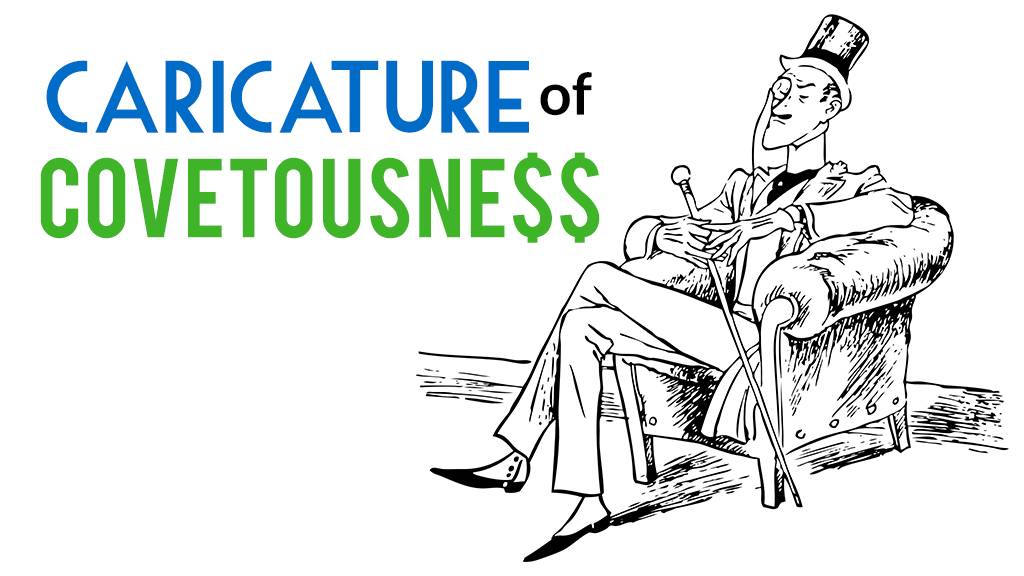One of Christ’s most pointed directives comes to us on the subject of possessions and finances: “Take care, and be on your guard against all covetousness, for one’s life does not consist in the abundance of his possessions” (Luke 12:15). Christ said this directly to a man who asked the Messiah to be the arbiter of his father’s estate. With his father now dead, the man’s brother was refusing to fairly separate the inheritance. As a rabbi, it would have been appropriate for Jesus to moderate a local dispute among fellow Jews. But there was something more important going on. Something of eternal importance was at stake. This man had a covetous heart (Luke 12:13-15).
To warn the young man and the nearby crowd of the damnable dangers of a covetous heart, Christ tells the story of an excessively rich man. In this caricature of covetousness, Jesus reveals the eternal consequences of living for the abundance of things.
You are living for the abundance of things when you do not consider your neighbor. (Luke 12:16-18)
Jesus opens this parable by telling the listener of a rich man who got even richer when the land of this man produced plentifully. What a quandary! This poor fellow has nowhere to store his abundance. Talk about #FirstWorldProbs. Rather than considering the plight of his neighbors in the midst of his exorbitant abundance, this rich man tore down his storage barns to build bigger ones.
Care for neighbor is a common theme in Luke’s gospel. In Luke 10, the parable of the Good Samaritan teaches the believer to “Love your neighbor as yourself.” Following this parable are three parables of rich men who fail to do so; all three parables record eternal consequences.
- Luke 12 – The rich man who built bigger barns. This man is called a “Fool” and his soul is required of him.
- Luke 16 – The rich man who faired sumptuously allowed Lazarus to starve right outside his gate. This rich man finds himself in flames after death while Lazarus enjoys the bosom of Abraham.
- Luke 18 – The rich young ruler in Luke 18 was told to sell his possessions and help the poor—his neighbors. We went away sorrowing because he had many possessions.
Let’s get practical. When was the last time you truly cared for your neighbor? I’m not talking about random acts of kindness or paying it forward. These things are great, and if anyone should pay it forward, it should be Christians. But, the contrast of the good Samaritan in Luke 10 who gave abundantly out of his meager supply, and the rich man of Luke 12 who hoarded his great abundance all to himself is startling. We must strive to be more like this Samaritan who went out of his way to help the wounded, hurting, and less fortunate.
You are living for the abundance of things when your security is in earthly things (Luke 12:19-20)
You might say this rich man was “a self-made man.” He was ready to live out the rest of his life in comfort (verse 19), but on this night, the Righteous Judge—the same Judge who earlier in the chapter refused to settled the dispute over the inheritance—required this man’s soul.
The problem wasn’t that this rich man owned possessions; the problem is that he was placing his security in his possessions. Being rich is not a sin; loving riches is a sin (1 Tim. 6:10). In fact, it is good, necessary, and wise to use our possessions now and in the future for the glory of God. You having money and possessions is not a problem; the problem is when money and possessions have you.
Paul’s instruction to Timothy about the rich is on target with this theme. He said, “As for the rich in this present age, charge them not to be haughty, nor to set their hopes on the uncertainty of riches, but on God, who richly provides us with everything to enjoy. They are to do good, to be rich in good works, to be generous and ready to share, thus storing up treasure for themselves as a good foundation for the future, so that they may take hold of that which is truly life” (1 Tim. 6:17-19). Notice, Paul didn’t tell the rich to get rid of their riches; rather, he called them to have a correct perspective and to serve God by serving others.
The rich man of Luke 12 did exactly as Paul commanded the rich not to do, he placed his hopes on the uncertainty of riches. This is magnified by the declaration of the Righteous Judge: “Fool! This night your soul is required of you, and the things you have prepared, whose will they be?”
You are living for the abundance of things when you do not seek God above everything else. (Luke 12:21, 31-34)
“So is the one who lays up treasure for himself and is not rich toward God.” The fact that he was not “rich towards God” reveals that the rich man’s priorities were wrong. He was rich towards crops, bigger barns, meat and wine, and more servants. He was rich towards his corvette, his career, and his gadgets. He was rich towards his comfort and security. These were his priorities, and these priorities, that he thought would lead to success, were his downfall. This was and still is a damning mistake.
We should be careful to understand that it is possible to be rich towards one’s neighbor and still fail to be rich towards God. There are many philanthropists who do not know Christ as Savior. Showing kindness to your neighbor does guarantee your salvation; kindness to neighbor is the expected fruit of one who has received God’s gift of salvation.
Just a few verses after this parable, Luke records a powerful challenge from Jesus: “Seek his kingdom, and these things will be added to you. . . .Sell your possessions, and give to the needy. Provide yourselves with moneybags that do not grow old, with a treasure in the heavens that does not fail, where no thief approaches and no moth destroys. For where your treasure is, there will your heart be also.” Such extreme talk was not uncommon from Jesus. Remember “if anyone comes to me and does not hate his own father and mother. . . he cannot be my disciple” in Luke 14:26?
Balancing these passages with the rest of Scripture, it doesn’t seem that Jesus is teaching against owning possessions or having a family. Jesus is calling us to a radical perspective on our possessions and relationships! Our focus on Christ and his kingdom should be so great that we are willing to forsake all possessions and relationships to please him. Thankfully, God most often times uses our possessions and relationships to build His Kingdom.
Jim Elliot said, “He is no fool who gives what he cannot keep to gain what he cannot lose.”
Covetousness—a strong desire for material possessions—is a temptation for the rich and the poor. Regardless of our financial situation, Christ is calling everyone to a life that is completely consecrated to the Kingdom of Christ, not bogged down by the things of this world. May God help us to live for an abundance of His glory in our lives rather than an abundance of things, and may this caricature of covetousness never be characteristic of our lives.







One Response